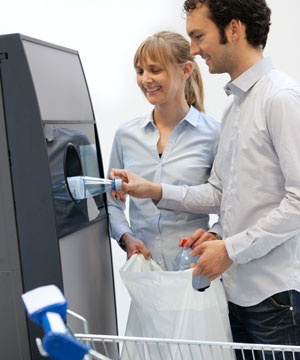MPs call for bottle deposit scheme and producer responsibility overhaul
The UK needs a nationwide deposit return scheme (DRS) for plastic bottles and overhaul producer responsibility rules if it is to turn back the tide on plastic waste entering the environment, according to Parliament’s Environmental Audit Committee (EAC).
 In the first of two major reports looking at packaging in the UK following a major EAC inquiry, the select committee, which scrutinises the government’s action and policy on environmental matters, has called on the government to introduce a ‘well-designed’ deposit scheme, whereby an extra charge is applied to plastic bottles and can be reclaimed by consumers when they return it for recycling.
In the first of two major reports looking at packaging in the UK following a major EAC inquiry, the select committee, which scrutinises the government’s action and policy on environmental matters, has called on the government to introduce a ‘well-designed’ deposit scheme, whereby an extra charge is applied to plastic bottles and can be reclaimed by consumers when they return it for recycling.
It also calls for the government to make major changes to UK producer responsibility, to make packaging producers more financially responsible for their products, and to phase in a mandated minimum recycled plastic content in plastic bottles to stimulate the recycled plastics market, a target it says should be met by 2023.
“We need action at individual, council, regional and national levels to turn back the plastic tide,” said Mary Creagh MP, Chair of the EAC, following the publication of the committee’s ‘Plastic Bottles: Turning Back the Plastic Tide’ report.
The UN this month established plans for a taskforce on ocean waste pollution, which Executive United Nations Environment Programme Director Erik Solheim called “an ocean Armageddon”. Between 8-12 million tonnes of plastic waste are estimated to be entering our oceans every year.
Deposit return scheme
While the recycling rate of plastic bottles has increased from one per cent in 2001 to 57 per cent in 2016, it has not increased in the last five years, the EAC heard, meaning around 15 million plastic bottles are littered, sent to landfill or incinerated every day.
Evaluating the pros and cons of a deposit return scheme as a solution to this has been one of the main aspects of this inquiry, during which Environment Secretary Michael Gove launched a public call for evidence on how reward and return schemes could work in England.

It is certainly a divisive issue, with negative impacts on local authorities who already collect plastic at the kerbside and small businesses among the chief concerns. However, it is also backed by a number of environmental bodies, including the Green Alliance, which says that as 33 per cent of plastic litter comes from plastic bottles, and with global plastic bottle production forecast to increase by 20 per cent by 2021, a DRS would provide an effective solution for their capture, with the additional value of ensuring high quality material is collected - essential given the potential loss of China as an export destination for waste plastics.
The EAC report says that these differing stances should be taken on board, but that a DRS should be introduced with the aim of boosting the plastic bottle recycling rate to 90 per cent: ‘The government should consult with industry stakeholders and local authorities to ensure that their concerns are accounted for in the design of the scheme. The monies raised from this scheme should be reinvested in plastic reprocessing facilities in the UK.’
This call has already been criticsed by the British Plastics Federation, which, said in a statement: “We are disappointed to see potentially misleading information contained in the report that overstates the potential gain from a DRS by not including the current recycling level for beverage containers in the UK. The current recycling rate for consumer plastics drink bottles is 74 per cent which is not mentioned. In addition, the report makes misleading statements about the number of bottles that would fall inside the recommended deposit scheme. Focusing on narrow interventions that target single items in our waste stream will not enable comprehensive recycling of all materials or make significant differences in the volume of litter. PET beverage containers account for only 20 per cent of beverage related litter and only two per cent of all litter on our streets.”
The BPF did, however, welcome the EAC's recognition that a government and industry-led initiative for on-the-go consumption of food and drinks may be necessary.
Producer responsibility overhaul
Response to the ‘plastic crisis’ must be carried out across the supply chain, however, and the EAC has made recommendations for a major change in how producer responsibility for plastic packaging products works.
Speaking to the committee, Lee Marshall, CEO of the Local Authority Recycling Advisory Committee (LARAC), explained that the UK’s producer responsibility system had “failed the Ronseal test”, passing the majority of the financial buck onto local authorities, who have to fund and carry out the collection of packaging themselves: “Producers are not responsible in terms of a cost point of view, providing perhaps only ten per cent [of funding for collections], while local authorities are funding the other 90 per cent”, said Marshall.
The committee is therefore calling on the government to adopt a new producer responsibility compliance fee structure that rewards design for recyclability and increases charges on packaging that is difficult to recycle.
The report urges the government to phase in a mandated minimum 50 per cent recycled plastic content in plastic bottles to stimulate and underwrite the recycled plastics market, and to ensure that the industry has an incentive to reuse plastics. This target should be reached by 2023 at the latest, it says.
Earlier this year, Simon Ellin of the Recycling Association picked out bottles that makes use of film sleeves that can disrupt the recycling process as one of the worst offenders for unsustainable packaging. The EAC said that the government could use its upcoming Waste and Resources Strategy to reduce the number and type of plastics in use in the UK to ‘move to a truly sustainable, resource efficient economy’, creating demand for recycled plastics even when the oil price is low and incentivise greater capture’ and ‘incentivis[ing] the beverage container industry to reduce their use of unnecessary mixed polymer plastics and improve the quality of rPET produced in the UK.’
The difference between the UK’s packaging producer responsibility system, the cheapest in Europe, and other systems on the continent, which see producers take a more active role, is another oft-discussed topic. The EAC says that the government should introduce a varied compliance fee structure that reduces costs for easily recyclable, simple plastics and raises costs on packaging that is difficult to recycle.
“Packaging producers don’t currently have to bear the full financial burden of recycling their packaging,” said Creagh. “By reforming producer responsibility charges, the government can ensure that producers and retailers will have financial incentives to design packaging that is easily recyclable, or face higher compliance costs.”
Access to free drinking water
Finally, on a consumer level, better access to free water has been suggested as a low-cost intervention to reduce plastic waste. Refill networks, like the one in Bristol, highlight locations that water bottles can be filled, meaning that people on the move don’t need to buy single-use bottles of water or other drink.

It says: ‘The government should review the health and litter-reducing benefits of providing public water fountains and amend the Water Industry Act 1991 to give water companies formal powers to erect water fountains. These actions could cut usage of plastic water bottles by 65 per cent.’
Summing up the wide-ranging report, Creagh said: “Urgent action is needed to protect our environment from the devastating effects of marine plastic pollution which, if it continues to rise at current rates, will outweigh fish by 2050. Our throwaway society uses 13 billion plastic bottles each year, around half of which are not recycled. Plastic bottles make up a third of all plastic pollution in the sea, and are a growing litter problem on UK beaches.
The full ‘Plastic Bottles: Turning Back the Plastic Tide’ can be read and downloaded on the Environmental Audit Committee’s website.
Mary Creagh was last year’s winner of Resource’s Hot 100 poll of the biggest influencers in the waste and resources world. To vote in this year’s poll, visit the Hot 100 website. 









